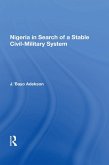Stable Outside, Fragile Inside? (eBook, ePUB)
Post-Soviet Statehood in Central Asia
Redaktion: Kavalski, Emilian
54,95 €
54,95 €
inkl. MwSt.
Sofort per Download lieferbar

27 °P sammeln
54,95 €
Als Download kaufen

54,95 €
inkl. MwSt.
Sofort per Download lieferbar

27 °P sammeln
Jetzt verschenken
Alle Infos zum eBook verschenken
54,95 €
inkl. MwSt.
Sofort per Download lieferbar
Alle Infos zum eBook verschenken

27 °P sammeln
Stable Outside, Fragile Inside? (eBook, ePUB)
Post-Soviet Statehood in Central Asia
Redaktion: Kavalski, Emilian
- Format: ePub
- Merkliste
- Auf die Merkliste
- Bewerten Bewerten
- Teilen
- Produkt teilen
- Produkterinnerung
- Produkterinnerung

Bitte loggen Sie sich zunächst in Ihr Kundenkonto ein oder registrieren Sie sich bei
bücher.de, um das eBook-Abo tolino select nutzen zu können.
Hier können Sie sich einloggen
Hier können Sie sich einloggen
Sie sind bereits eingeloggt. Klicken Sie auf 2. tolino select Abo, um fortzufahren.

Bitte loggen Sie sich zunächst in Ihr Kundenkonto ein oder registrieren Sie sich bei bücher.de, um das eBook-Abo tolino select nutzen zu können.
This timely volume analyses the quality of statehood in Central Asia by assessing the complex dynamics of Central Asian state-making and focusing on the simultaneous patterns of socialization and internalization in the region - thus bringing Central Asia into the mainstream of systematic interrogation.
- Geräte: eReader
- mit Kopierschutz
- eBook Hilfe
- Größe: 5.24MB
Andere Kunden interessierten sich auch für
![International Mediation in a Fragile World (eBook, ePUB) International Mediation in a Fragile World (eBook, ePUB)]() International Mediation in a Fragile World (eBook, ePUB)46,95 €
International Mediation in a Fragile World (eBook, ePUB)46,95 €![Managing Violent Religious Extremism in Fragile States (eBook, ePUB) Managing Violent Religious Extremism in Fragile States (eBook, ePUB)]() Abosede Omowumi BabatundeManaging Violent Religious Extremism in Fragile States (eBook, ePUB)44,95 €
Abosede Omowumi BabatundeManaging Violent Religious Extremism in Fragile States (eBook, ePUB)44,95 €![The Fragile Entente (eBook, ePUB) The Fragile Entente (eBook, ePUB)]() Robert E BedeskiThe Fragile Entente (eBook, ePUB)40,95 €
Robert E BedeskiThe Fragile Entente (eBook, ePUB)40,95 €![Explaining Politics (eBook, ePUB) Explaining Politics (eBook, ePUB)]() Oliver WoshinskyExplaining Politics (eBook, ePUB)70,95 €
Oliver WoshinskyExplaining Politics (eBook, ePUB)70,95 €![Inside the Bubble (eBook, ePUB) Inside the Bubble (eBook, ePUB)]() Barbara TrishInside the Bubble (eBook, ePUB)35,95 €
Barbara TrishInside the Bubble (eBook, ePUB)35,95 €![Inside Gorbachev's Kremlin (eBook, ePUB) Inside Gorbachev's Kremlin (eBook, ePUB)]() Yegor LigachevInside Gorbachev's Kremlin (eBook, ePUB)63,95 €
Yegor LigachevInside Gorbachev's Kremlin (eBook, ePUB)63,95 €![Nigeria In Search Of A Stable Civil-military System (eBook, ePUB) Nigeria In Search Of A Stable Civil-military System (eBook, ePUB)]() J. 'Bayo AdeksonNigeria In Search Of A Stable Civil-military System (eBook, ePUB)42,95 €
J. 'Bayo AdeksonNigeria In Search Of A Stable Civil-military System (eBook, ePUB)42,95 €-
-
-
This timely volume analyses the quality of statehood in Central Asia by assessing the complex dynamics of Central Asian state-making and focusing on the simultaneous patterns of socialization and internalization in the region - thus bringing Central Asia into the mainstream of systematic interrogation.
Dieser Download kann aus rechtlichen Gründen nur mit Rechnungsadresse in A, B, BG, CY, CZ, D, DK, EW, E, FIN, F, GR, HR, H, IRL, I, LT, L, LR, M, NL, PL, P, R, S, SLO, SK ausgeliefert werden.
Produktdetails
- Produktdetails
- Verlag: Taylor & Francis eBooks
- Seitenzahl: 252
- Erscheinungstermin: 1. April 2016
- Englisch
- ISBN-13: 9781317050919
- Artikelnr.: 44873785
- Verlag: Taylor & Francis eBooks
- Seitenzahl: 252
- Erscheinungstermin: 1. April 2016
- Englisch
- ISBN-13: 9781317050919
- Artikelnr.: 44873785
- Herstellerkennzeichnung Die Herstellerinformationen sind derzeit nicht verfügbar.
Emilian Kavalski is Associate Professor of Global Studies at the Institute for Social Justice, Australian Catholic University (Sydney). He is currently working on (i) the encounter of International Relations with life in the Anthropocene, especially the conceptualization of and engagement with non-human actors; and (ii) the nascent Asian normative orders and the ways in which they confront, compliment, and transform established traditions, norms, and institutions. Emilian contends that in both these areas the application of Complexity Thinking has important implications for the way global life is approached, explained, and understood. At the same time, these research foci sketch a prolegomenon to the conceptual contexts of theory-building and policy-making intent on facilitating economic, social, and environmental interactions that promote the well-being of people in ways that are just, equitable, and sustainable.
The international politics of fusion and fissure in the awkward states of
post-Soviet Central Asia, Emilian Kavalski; Part 1 Analytical Perspectives
on the Post-Soviet Statehood of Central Asia: Applying the democratization
literature to post-Soviet Central Asian statehood, Paul Kubicek; The
problems of the 'clan' politics model of Central Asian statehood: a call
for alternative pathways for research, David Gullette; The international
political economy of Central Asian statehood, Martin C. Spechler and Dina
R. Spechler; Central Asian statehood in post-colonial perspective, John
Heathershaw. Part 2 Insights from the Processes of Localization in the
Dynamics of Central Asian State-Making: International democratic norms and
domestic socialization in Kazakhstan: learning processes of the power
elite, Kirill Nourzhanov; International agency in Kyrgyzstan: rhetoric,
revolution and renegotiation, Claire Wilkinson; The limits of international
agency: post-Soviet state building in Tajikstan, Lawrence P. Markowitz;
Turkmenistan: flawed, fragile and isolated, Steven Sabol; Stalled at the
doorstep of a modern state: neopatrimonial regime in Uzbekistan, Alisher
Ilkhamov; Bibliography; Index.
post-Soviet Central Asia, Emilian Kavalski; Part 1 Analytical Perspectives
on the Post-Soviet Statehood of Central Asia: Applying the democratization
literature to post-Soviet Central Asian statehood, Paul Kubicek; The
problems of the 'clan' politics model of Central Asian statehood: a call
for alternative pathways for research, David Gullette; The international
political economy of Central Asian statehood, Martin C. Spechler and Dina
R. Spechler; Central Asian statehood in post-colonial perspective, John
Heathershaw. Part 2 Insights from the Processes of Localization in the
Dynamics of Central Asian State-Making: International democratic norms and
domestic socialization in Kazakhstan: learning processes of the power
elite, Kirill Nourzhanov; International agency in Kyrgyzstan: rhetoric,
revolution and renegotiation, Claire Wilkinson; The limits of international
agency: post-Soviet state building in Tajikstan, Lawrence P. Markowitz;
Turkmenistan: flawed, fragile and isolated, Steven Sabol; Stalled at the
doorstep of a modern state: neopatrimonial regime in Uzbekistan, Alisher
Ilkhamov; Bibliography; Index.
The international politics of fusion and fissure in the awkward states of
post-Soviet Central Asia, Emilian Kavalski; Part 1 Analytical Perspectives
on the Post-Soviet Statehood of Central Asia: Applying the democratization
literature to post-Soviet Central Asian statehood, Paul Kubicek; The
problems of the 'clan' politics model of Central Asian statehood: a call
for alternative pathways for research, David Gullette; The international
political economy of Central Asian statehood, Martin C. Spechler and Dina
R. Spechler; Central Asian statehood in post-colonial perspective, John
Heathershaw. Part 2 Insights from the Processes of Localization in the
Dynamics of Central Asian State-Making: International democratic norms and
domestic socialization in Kazakhstan: learning processes of the power
elite, Kirill Nourzhanov; International agency in Kyrgyzstan: rhetoric,
revolution and renegotiation, Claire Wilkinson; The limits of international
agency: post-Soviet state building in Tajikstan, Lawrence P. Markowitz;
Turkmenistan: flawed, fragile and isolated, Steven Sabol; Stalled at the
doorstep of a modern state: neopatrimonial regime in Uzbekistan, Alisher
Ilkhamov; Bibliography; Index.
post-Soviet Central Asia, Emilian Kavalski; Part 1 Analytical Perspectives
on the Post-Soviet Statehood of Central Asia: Applying the democratization
literature to post-Soviet Central Asian statehood, Paul Kubicek; The
problems of the 'clan' politics model of Central Asian statehood: a call
for alternative pathways for research, David Gullette; The international
political economy of Central Asian statehood, Martin C. Spechler and Dina
R. Spechler; Central Asian statehood in post-colonial perspective, John
Heathershaw. Part 2 Insights from the Processes of Localization in the
Dynamics of Central Asian State-Making: International democratic norms and
domestic socialization in Kazakhstan: learning processes of the power
elite, Kirill Nourzhanov; International agency in Kyrgyzstan: rhetoric,
revolution and renegotiation, Claire Wilkinson; The limits of international
agency: post-Soviet state building in Tajikstan, Lawrence P. Markowitz;
Turkmenistan: flawed, fragile and isolated, Steven Sabol; Stalled at the
doorstep of a modern state: neopatrimonial regime in Uzbekistan, Alisher
Ilkhamov; Bibliography; Index.







